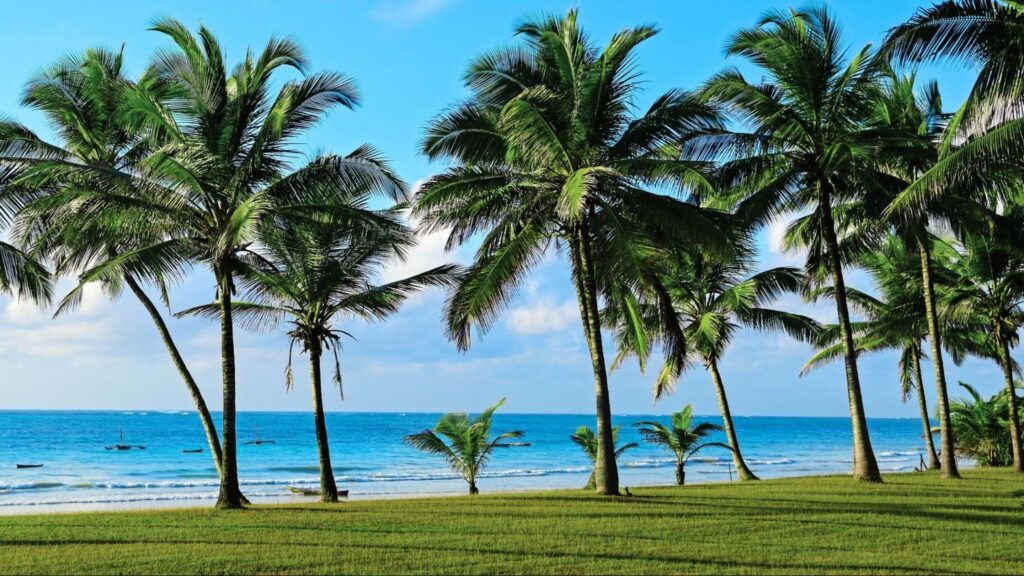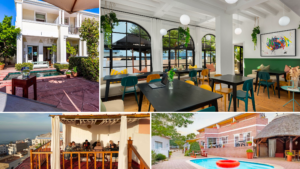Cabo Verde, a group of islands located off the coast of West Africa, is becoming an increasingly popular destination for digital nomads. With its stunning landscapes, year-round warm weather, and affordable cost of living, it offers an ideal setting for those seeking a flexible and remote work lifestyle.
With reliable internet connections and a growing community of digital nomads, finding like-minded individuals and establishing a support network is easy.
This guide aims to provide insights into the digital nomad lifestyle in Cabo Verde and offer a comprehensive overview for those considering this location as their next work-from-anywhere destination. Cabo Verde offers a range of benefits for digital nomads.
Jump To:
Things to Do in Cabo Verde | Destinations | Internet | Coworking Spaces | Coliving Spaces | Best Times to Visit | Visas | Cost of Living | How to Get There | Safety and Security | Frequently Asked Questions
| Main Languages | Portuguese, Cape Verdean Creole |
| Capital city | Praia |
| Main airport | Amílcar Cabral International Airport (Sal); Nelson Mandela International Airport (Praia); Cesária Évora Airport (São Vicente) |
| Currency | Cape Verdean Escudo (CVE) |
| Time Zone | Cape Verde Time (UTC -1) |
| Plug Socket Type | Type C and F |
| Best time(s) to Visit | October to May |
| Internet Quality | Good |
| Highlights | Beautiful Beaches; Cultural Festivals; Volcanic Landscapes |
Things to Do in Cabo Verde
Cabo Verde is a beautiful archipelago with a lot of attractions and things to do, making it a great destination for digital nomads. Here are some of the top activities and places to visit:
Islands
Cabo Verde consists of ten islands, each with its own unique charm. The eastern islands, such as Sal, Boa Vista, and Maio, are known for their long sandy beaches and deserts, while the western islands, such as Santiago and Fogo, are mountainous and rockier. Each island offers something different, so it’s worth exploring as many as possible.
Beaches
Cabo Verde has some of the most stunning beaches in the world, with crystal clear water and white sand. Sal and Boa Vista are particularly popular for their beaches, which are perfect for swimming, sunbathing, and water sports.
Mountains and Hikes
The archipelago is also home to some breathtaking mountains and hiking trails. Santo Antão’s green Paul Valley is famous for its hiking, as well as the volcanic hike to Pico do Fogo on Fogo Island, the highest point of the archipelago at 2829 meters above sea level.
Water Sports
Cabo Verde is a paradise for water sports enthusiasts, with opportunities for kitesurfing, windsurfing, and surfing. The kitesurfing beaches are mostly in Sal, Boavista, and São Vicente, where you can enjoy the perfect wind conditions.
Carnival
Carnival is a major event in Cabo Verde, with colorful parades, music, and dancing. The biggest carnival takes place in Mindelo on São Vicente Island, where you can experience the vibrant local culture.
Day Trips
There are plenty of day trips to take in Cabo Verde, from exploring the historic city of Cidade Velha on Santiago Island to visiting the salt mines on Sal Island. You can also take a boat trip to nearby islands or go whale watching.
Overall, Cabo Verde has something for everyone, from relaxing on the beach to exploring the mountains and experiencing the local culture.
Best Destinations for Digital Nomads
Cabo Verde is a perfect destination for digital nomads looking for a place to live, work, and explore. With ten beautiful islands to choose from, each with its unique charm and culture, there is something for everyone. Here are some of the best destinations and places to live for digital nomads in Cabo Verde.
Mindelo
Mindelo is the cultural capital of Cabo Verde and a perfect destination for digital nomads looking for a vibrant city to live in. With its colorful colonial architecture, lively music scene, and beautiful beaches, Mindelo offers a unique blend of history, culture, and natural beauty. Coworking spaces like Cowork Cabo Verde and Mindelo Business Center provide excellent facilities for remote workers.
Praia
Praia is the capital city of Cabo Verde and a great destination for digital nomads looking for a modern and bustling city to live in. With its vibrant nightlife, excellent restaurants, and beautiful beaches, Praia has something for everyone. Coworking spaces like NOSi Akademia and Cowork Praia provide excellent facilities for remote workers.
Santo Antão
Santo Antão is the perfect destination for digital nomads looking for a peaceful and relaxed island to live in. With its stunning natural beauty, including lush valleys, rugged mountains, and beautiful beaches, Santo Antão is a paradise for nature lovers. Coworking spaces like Coworking Santo Antão provide excellent facilities for remote workers.
Boa Vista
Boa Vista is the perfect destination for digital nomads looking for a sunny and laid-back island to live in. With its beautiful beaches, crystal-clear waters, and year-round sunshine, Boa Vista is a paradise for beach lovers. Coworking spaces like Coworking Boa Vista provide excellent facilities for remote workers.
Fogo
Fogo is the perfect destination for digital nomads looking for a unique and adventurous island to live in. With its active volcano, rugged landscapes, and charming colonial towns, Fogo offers a unique blend of adventure, culture, and natural beauty. Coworking spaces like Coworking Fogo provide excellent facilities for remote workers.
Whether you’re looking for a vibrant city, a peaceful island, or an adventurous destination, Cabo Verde has something for everyone. With excellent facilities for remote workers, including coworking spaces, apartments, and hotels, Cabo Verde is the perfect destination for digital nomads on a budget.
Internet Connectivity
Cabo Verde offers reliable and fast internet connectivity, making it a great destination for digital nomads. The country has several internet service providers, including CVTelecom, Unitel T+, and Cabo Verde Telecom.
WiFi
Most cafes, restaurants, and co-working spaces in Cabo Verde offer free WiFi to customers. The WiFi speed is generally fast and reliable, making it easy to work remotely. However, it is recommended to have a backup plan in case the WiFi goes down.
SIM Card
For those who prefer to work on-the-go, purchasing a local SIM card is a great option. There are several mobile network operators in Cabo Verde, including CV Móvel, Unitel T+, and Cabo Verde Telecom. SIM cards can be purchased at the airport or at mobile network operator stores throughout the country. Prices for data plans are affordable, and the coverage is good throughout the islands.
Overall, Cabo Verde offers excellent internet connectivity, making it a great destination for digital nomads who need to stay connected while working remotely. Whether you prefer to work from a café or on-the-go, there are plenty of options available to meet your needs.
Coworking Spaces
Cabo Verde is a perfect destination for digital nomads looking for a coworking space to work from. The country has a growing number of coworking spaces that offer excellent facilities, fast internet, and a vibrant community. Here are some of the best coworking spaces in Cabo Verde:
Coworking Mindelo
Located in the heart of Mindelo, Coworking Mindelo is a popular coworking space that offers a comfortable and productive environment for digital nomads. The space features high-speed internet, comfortable chairs and desks, and a well-equipped kitchen. Coworking Mindelo also hosts regular events and workshops, making it an excellent place to meet other like-minded individuals.
Sal Works
Sal Works is a modern coworking space located in Santa Maria, Sal Island. The space offers a variety of workstations, private offices, and meeting rooms, making it an excellent choice for digital nomads who need a flexible workspace. Sal Works also provides high-speed internet, printing and scanning facilities, and a comfortable lounge area.
Espaço 55
Espaço 55 is a coworking space located in the heart of Praia, the capital city of Cabo Verde. The space offers a variety of workstations, private offices, and meeting rooms, making it an excellent choice for digital nomads who need a flexible workspace. Espaço 55 also provides high-speed internet, printing and scanning facilities, and a comfortable lounge area.
Working Spaces
In addition to coworking spaces, Cabo Verde also has a growing number of working spaces that offer excellent facilities for digital nomads. Working Spaces is a popular choice for digital nomads who need a flexible workspace. The space features high-speed internet, comfortable chairs and desks, and a well-equipped kitchen. Working Spaces also hosts regular events and workshops, making it an excellent place to meet other like-minded individuals.
Overall, Cabo Verde has a lot to offer digital nomads looking for a coworking space or working space. With a growing number of options available, you’re sure to find a space that suits your needs and budget.
Coliving Spaces
Cabo Verde offers a variety of coliving spaces for digital nomads and remote workers. These spaces provide a comfortable and productive environment for individuals who want to work and live in a community of like-minded people.
One of the most popular coliving spaces in Cabo Verde is Digital Nomads Cabo Verde. They offer a variety of accommodations, including private rooms, shared rooms, and apartments. Their spaces are designed to provide a comfortable and productive environment for digital nomads and remote workers. They also offer coworking spaces, high-speed internet, and other amenities to ensure that you can work efficiently.
Another great option is Deskless Nomad. They offer coliving spaces in various locations throughout Cabo Verde. Their spaces are designed to provide a comfortable and productive environment for digital nomads and remote workers. They also offer coworking spaces, high-speed internet, and other amenities to ensure that you can work efficiently.
If you’re looking for a more luxurious option, then you might want to consider Kasa Cabo Verde. They offer a variety of accommodations, including private rooms, shared rooms, and apartments. Their spaces are designed to provide a comfortable and productive environment for digital nomads and remote workers. They also offer coworking spaces, high-speed internet, and other amenities to ensure that you can work efficiently.
Overall, Cabo Verde offers a variety of coliving spaces for digital nomads and remote workers. These spaces provide a comfortable and productive environment for individuals who want to work and live in a community of like-minded people.
Best Times to Visit
Cabo Verde is a year-round destination, but the best time to visit depends on what you want to do and see. The archipelago has a subtropical climate, with temperatures ranging from 22°C to 30°C. The trade winds provide a pleasant breeze that keeps the temperature comfortable.
The best time to visit Cabo Verde is from October to May during the dry season. During this time, the weather is warm and sunny, and there is very little rain. This is the perfect time for outdoor activities such as hiking, surfing, and sunbathing.
If you are looking for a quieter time to visit, then consider visiting between June and September. This is the rainy season, and there is a higher chance of rain, but it is still a great time to visit as the islands are less crowded, and prices are lower.
Worst Times to Visit
The worst time to visit Cabo Verde is during the rainy season, which runs from August to September. During this time, there can be heavy downpours, which can cause flooding and make it difficult to get around. The humidity can also be high, making it uncomfortable for some visitors.
Another time to avoid is during the windy season, which runs from October to mid-July. The winds can be strong, making it difficult to enjoy outdoor activities such as surfing and sailing. However, if you are a windsurfer or kitesurfer, then this is the perfect time to visit as the winds are ideal for these sports.
In summary, the best time to visit Cabo Verde is from October to May during the dry season. However, if you are looking for a quieter time to visit, then consider visiting between June and September. Avoid visiting during the rainy season in August and September and the windy season from October to mid-July.
Tourist and Digital Nomad Visas
Cabo Verde offers different types of visas for tourists and digital nomads. Here’s what you need to know:
Tourist Visa
All travelers can enter Cabo Verde for up to 30 days without a visa by payment of the 30 Euros Airport Security Tax – paid on arrival, or in advance via the EASE online form. You should complete this form online at least 5 days in advance of travel to Cabo Verde.
If you plan to stay longer than 30 days, you can apply for a tourist visa at the Cabo Verde embassy or consulate in your home country. The tourist visa allows you to stay up to 90 days.
Digital Nomad Visa
Cabo Verde operates a dedicated visa program for remote workers. The digital nomad visa program allows you to stay in Cabo Verde for up to 6 months with the option to renew. To be eligible for the digital nomad visa, you must meet the following requirements:
- Proof of remote work for a company or as a freelancer
- A minimum monthly income of €1,500
- Health insurance coverage valid in Cabo Verde
The digital nomad visa application process is straightforward. You can apply online or at the Cabo Verde embassy or consulate in your home country. The visa fee is €220, and the processing time is usually 2-3 weeks.
Other Visas
If you plan to work or study in Cabo Verde, you will need to apply for a work or student visa. The requirements and application process vary depending on your situation. It’s best to check with the Cabo Verde embassy or consulate in your home country for specific information.
It’s important to note that the information provided here is accurate at the time of writing. Visa requirements and procedures can change, so it’s always a good idea to check with the Cabo Verde embassy or consulate in your home country for the most up-to-date information.
Cost of Living
Cabo Verde is an affordable destination for digital nomads compared to many other popular locations. The currency used in Cabo Verde is the Cape Verdean Escudo (CVE), but the Euro (EUR) is also accepted in some places. The exchange rate between the Euro and the Escudo is fixed at 1 EUR = 110.265 CVE.
The cost of living in Cabo Verde varies depending on the island you choose to stay on. Sal and Boa Vista are the most popular islands for digital nomads due to their beautiful beaches and reliable internet. The cost of living on these islands is slightly higher than on other islands.
Below is a breakdown of some common expenses in Cabo Verde:
-
Accommodation: A one-bedroom apartment in a central location can cost around 20,000 CVE to 30,000 CVE per month (180 EUR to 270 EUR).
-
Food: A meal at a local restaurant can cost around 1,500 CVE to 2,500 CVE (13.5 EUR to 22.5 EUR). Groceries for a week can cost around 5,000 CVE to 10,000 CVE (45 EUR to 90 EUR).
-
Transportation: Taxis are the most common form of transportation on the islands. A short ride can cost around 500 CVE to 1,000 CVE (4.5 EUR to 9 EUR).
-
Internet: Internet speeds are generally reliable on Sal and Boa Vista. You can expect to pay around 5,000 CVE to 10,000 CVE (45 EUR to 90 EUR) per month for a high-speed internet connection.
It’s important to note that prices can vary depending on the season and location. The cost of living in Cabo Verde is generally lower than in many European countries, making it an attractive destination for digital nomads looking for an affordable place to live and work.
How to Get There
Cabo Verde is easily accessible by air from Europe, Africa, and the Americas. The main international airport is Amílcar Cabral International Airport (SID) located on the island of Sal. Direct flights to Sal are available from several European cities such as Lisbon, Paris, Amsterdam, and London. Cabo Verde is also served by several African airlines including TAP Air Portugal, Royal Air Maroc, and Ethiopian Airlines.
Once you arrive at Amílcar Cabral International Airport, you can take a taxi or a bus to your destination. Taxis are available outside the airport terminal and are a convenient way to get to your hotel or accommodation. The fares are fixed and depend on the distance to your destination. Alternatively, you can take a public bus to your destination. The bus stop is located a short walk from the airport terminal. The buses are cheap and reliable, but they can be crowded during peak hours.
If you are traveling between the islands, you can take a domestic flight operated by Binter Cabo Verde or TICV. Both airlines offer regular flights between the islands and have modern aircraft and good safety records. The domestic flights are affordable and convenient, but they can be affected by weather conditions.
In summary, getting to Cabo Verde is easy and convenient. You can take a direct flight to Sal and then take a taxi or a bus to your destination. Alternatively, you can take a domestic flight to travel between the islands.
Culture and Lifestyle
Culture and History
Cabo Verde boasts a unique blend of African, European, and Brazilian influences, which is reflected in its culture and history. The country has a rich history that dates back to the 15th century, when Portuguese explorers discovered the archipelago. Cabo Verde was an important stop on the Atlantic slave trade route, and its history is intertwined with that of the African continent. Visitors can learn about the country’s history by visiting museums and historical sites, such as the Forte Real de São Filipe in Mindelo.
Cuisine
Cabo Verdean cuisine is a fusion of African, Portuguese, and Brazilian flavors. The country’s national dish, cachupa, is a slow-cooked stew made with corn, beans, and vegetables, and is often served with fish or meat. Seafood is also a staple of Cabo Verdean cuisine, with fresh fish and shellfish readily available. Visitors can experience the local cuisine by dining at traditional restaurants, such as the Restaurante Mindelense in Mindelo.
Art and Music
Cabo Verde is known for its vibrant music scene, with genres such as morna, coladeira, and funaná originating from the islands. The country has produced internationally renowned musicians, such as Cesária Évora and Tito Paris. Visitors can enjoy live music performances at local bars and clubs, such as the Caravela Bar in Santa Maria. Cabo Verde is also home to a thriving arts scene, with local artists creating unique paintings, sculptures, and crafts.
Festivals
Cabo Verdeans love to celebrate, and the country has a number of festivals throughout the year. The most famous of these is the Carnival of Mindelo, which takes place in February and is known for its colorful costumes and lively music. Other festivals include the Baía das Gatas Music Festival in São Vicente and the Festival Internacional de Música da Praia in Praia.
Overall, Cabo Verde offers a unique cultural experience that reflects its rich history and diverse influences. Visitors can immerse themselves in the local cuisine, music, and arts, and participate in the country’s vibrant festivals and celebrations. Whether exploring the islands’ history or simply enjoying the local lifestyle, Cabo Verde has something for everyone.
Safety and Security
Cabo Verde is generally a safe and stable country, with low levels of crime. However, like in any other country, it is important to take necessary precautions to ensure your safety. Here are some tips to help you stay safe in Cabo Verde:
-
Be aware of your surroundings: Always be aware of your surroundings and avoid walking alone at night in unfamiliar areas.
-
Keep your valuables safe: Keep your valuables such as passports, money, and electronics in a secure place. Do not leave them unattended in public areas.
-
Use a valid passport: Make sure to use a valid passport when entering and leaving the country. Your passport should be valid for at least six months beyond your stay in Cabo Verde.
-
Stay up-to-date with travel warnings: Check for any travel warnings or alerts before traveling to Cabo Verde. The U.S. Department of State provides up-to-date information on travel advisories.
-
Be cautious with drugs: Cabo Verde has strict drug laws, and possession of even small amounts can lead to severe penalties. Avoid getting involved with drugs or drug-related activities.
-
Use licensed taxis: Use only licensed taxis, and avoid accepting rides from strangers. If possible, use taxis that are recommended by your hotel or a trusted source.
-
Emergency numbers: Keep emergency numbers handy, including the local police, ambulance, and fire department.
Overall, Cabo Verde is a safe and welcoming country for digital nomads. By taking necessary precautions, you can enjoy a safe and enjoyable stay in this beautiful country.
Frequently Asked Questions
What are the requirements for obtaining a residence permit in Cabo Verde?
To obtain a residence permit in Cabo Verde, you must have a valid passport, a clean criminal record, and proof of sufficient funds to support yourself. You may also need to provide proof of accommodation and health insurance. The process for obtaining a residence permit can take several months, so it’s important to plan ahead.
What is the internet connectivity like in Cabo Verde?
Internet connectivity in Cabo Verde is generally reliable, with speeds ranging from 10 to 20 Mbps. Most cafes and restaurants offer free Wi-Fi, and many co-working spaces have high-speed internet connections. However, some remote areas may have slower or less reliable internet connections.
Are there any co-living spaces or communities for digital nomads in Cabo Verde?
Yes, there are several co-living spaces and communities for digital nomads in Cabo Verde, including Surf Office Cabo Verde, Coworking Capo Verde, and Nomad House Cabo Verde. These spaces offer comfortable accommodations, high-speed internet, and opportunities to network with other digital nomads.
What is the process for obtaining a visa for Cabo Verde?
Citizens of many countries, including the United States and most European countries, can enter Cabo Verde without a visa for stays of up to 30 days. For longer stays, you will need to apply for a visa. The process for obtaining a visa can vary depending on your country of origin, but typically involves providing proof of accommodation, a return ticket, and sufficient funds to support yourself.
What is the cost of living like in Cabo Verde for digital nomads?
The cost of living in Cabo Verde is generally lower than in many other popular digital nomad destinations. Accommodation can range from $300 to $800 per month, depending on the location and type of accommodation. Food and transportation are also relatively affordable, with meals costing around $5 to $10 and taxis costing around $5 for a short ride.
What are some recommended areas to live in Cabo Verde for digital nomads?
Some recommended areas to live in Cabo Verde for digital nomads include Santa Maria on Sal Island, Mindelo on Sao Vicente Island, and Praia on Santiago Island. These areas offer a range of amenities, including co-working spaces, cafes, and restaurants, as well as beautiful beaches and cultural attractions.









